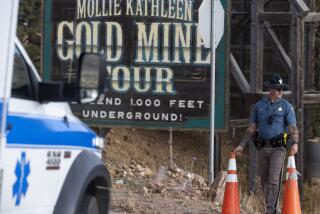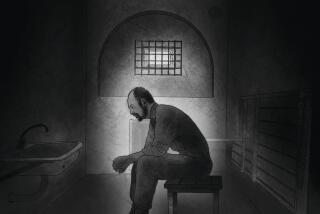‘Running Away From Death’
MOSCOW — Last Thursday was Vasily Avdeyev’s first day as director of the Zapadnaya mine, so he decided to “take the bull by the horns,” he said, and go down into the pit.
A wall of water like an ocean wave flooded the southern Russia coal mine that day, knocking Avdeyev off his feet. He spent the next five days with a small group of men “running away from death,” continually moving about to escape the rising waters and search for oxygen.
By Day 3, batteries faded, helmet lights died one by one, and the men lost hope.
“That was when most of us thought we were doomed and would never be saved,” Avdeyev, 53, said Wednesday by cellphone from his hospital bed in Novoshakhtinsk.
Another miner, Andrei Beloglazov, described what it was like after having been trapped more than 2,000 feet underground for 5 1/2 days: “When I saw the rescuers coming toward us I wanted to cry, but I had no tears because I lost all my tears down there in the long, long darkness.”
There were 71 miners in Zapadnaya when the waters crashed into the mine. Twenty-five quickly made their way to safety and 33 were rescued over the weekend, but 13 remained trapped almost a week before workers tunneled through from an adjacent shaft, saving 11.
There were many moments of despair before the winking lights of the rescuers signaled salvation to the trapped men. Their dying industry -- where pay is often delayed for months -- is one of Russia’s most dangerous.
“At times, the thought crossed my mind, ‘How stupid it is, to die doing a job you’re not even paid for,’ ” Beloglazov, 43, said, also in a cellphone interview from his hospital bed. He recently was paid his salary for March. “I don’t think I will want to go down a mine shaft again.”
There probably won’t be a chance to in Novoshakhtinsk, where six of nine mines had already been closed. Zapadnaya is now inoperable, and the future of the other two is in doubt.
The 11 survivors walked out of the mine Wednesday, their faces black with coal, blankets draped around their shoulders, while relatives called out their names. Wives wept and shook with emotion as the men walked to emergency vehicles, which took them to the hospital. One of the 11 was injured.
The body of Sergei Voitenyuk, who died when water from an underground lake broke into the mine, was carried out last on a stretcher. Rescuers were still searching for Sergei Tkach, who had left the others in search of an escape route.
The dramatic rescue, coinciding with a methane explosion at a mine in Russia’s Far East that killed five men, has underscored the frequent accidents and financial problems in the nation’s coal industry. Energy-rich Russia has no pressing need for most of its coal mines, which were founded mainly in the 1930s and ‘50s before the discovery of major oil and gas reserves. Yet because there are few other jobs in coal-mining towns, men risk their lives to dig up an unprofitable resource, and safety corners are cut to keep the mines open.
Avdeyev spent 25 years in mines, working his way up from ordinary miner to manager and finally director. He was appointed to lead Zapadnaya out of a financial crisis brought about when water flooded the mine early this year, forcing a temporary closure.
To the trapped men, Avdeyev was a rock of support as their ordeal wore on.
“He turned out to be brave and calm and solid. It felt good to be near him, kind of safer,” Beloglazov said.
Beloglazov was there when the initial wall of water swept Voitenyuk away.
“He slipped, and the wave carried him away. We called out his name. We tried looking for him, but we could go no farther. There was just so much water.
“When the water receded a few hours later, we found him dead. We all sat there when we found him. No one spoke. I thought my ears would explode with the silence.”
That was the moment when Beloglazov, who grew up an atheist in the Soviet Union, where religion was discouraged, found himself praying.
“I never prayed in my life. I didn’t believe in God. I prayed and prayed down there, and I began feeling much better and warmer, even.
“And I thought if I ever get out of here alive, I’ll go to a church and light a candle. Now I do believe in God, and in my friends.”
After the lights went out, the trapped men listened to the sound of the water, which “kept coming at us and going back and coming again, with a horrible sound like some beast in the dark,” Beloglazov said. “We sat there in the dark, clinging to each other to keep warm.”
There was no food, but people were too afraid to feel hungry, Avdeyev said.
“We had to follow oxygen, so we had to be on the move all the time, shifting from one place to another as the air ran out. After three days we had no lights. We drank the dirty water from the flow, which kept pursuing us.
“At some point I lost my nerve and I spoke to myself out loud, using the swear word that I never use in normal life,” he said, describing a moment when he asked himself why he had ever gone down the mine.
On Tuesday, the miners heard the thud of explosions and realized that rescuers were trying to blast a tunnel to them from a neighboring mine. Hope came rushing back. The rescuers broke through overnight, before Wednesday’s rescue.
In Russia, 68 men died in mine accidents last year. In many mines, the equipment is decades old, and upgrades are unaffordable.
After Wednesday’s rescue and the five deaths at the mine in Partizansk, President Vladimir V. Putin said mine accidents were systemic and ordered an investigation.
Novoshakhtinsk, population 116,000, is a typical coal town, with no other major industry. Zapadnaya began operating in 1938. Last January, 1,840 people worked at the mine. Now 814 are employed there, and 1,400 are at the two other operating pits.
“The rest of us would leave, but there are no jobs in the town at all,” said Zapadnaya trade union leader Andrei Kovalyov. “Today everybody is jubilant that our comrades were saved. But tomorrow they will wake up and start thinking about the future, and there is nothing good for us there.”
Kovalyov said the accident was to be expected after the flooding this year. When the six now-closed mines still operated, water from underground lakes was continually pumped out. But in 1999 a water-deviation system broke and there was no money to fix it, he said.
After facing his death and emerging into sunlight that felt blinding, Avdeyev said he would not stay in the job he started last week.
“I think the mine should be closed now. As for me, I will retire and go to my hometown, St. Petersburg.”
*
Times staff writer Sergei L. Loiko contributed to this report.
More to Read
Sign up for Essential California
The most important California stories and recommendations in your inbox every morning.
You may occasionally receive promotional content from the Los Angeles Times.










